The Department of Primary Industries and Regional Development (DPIRD) is committed to protecting the sustainability of Western Australia’s fisheries resources for future generations to enjoy and works closely with key stakeholders to achieve this.
As part of that commitment, DPIRD’s expert team of fisheries and aquatic research scientists is leading and collaborating with other scientists on a range of research projects to increase knowledge of key fish and invertebrate species and ecological processes, and provide environmental baselines for the Cockburn Sound marine environment.
These research projects are being delivered under the Western Australian Marine Science Institution (WAMSI) Westport Marine Science Program (Science Program) 2022. The research outcomes will inform key aspects of the design, environmental impact assessment, and mitigation strategies to maximise environmental and social outcomes for Westport, the future container port in Kwinana.
Working in partnership with The University of Western Australia, Curtin University, Murdoch University, Edith Cowan University and the CSIRO, DPIRD is leading or co-leading five of the seven projects in the Fisheries and Aquatic Resources theme of the Science Program, as well as contributing to other themes.
Theme 4 Fisheries and Aquatic Resources projects are designed to increase knowledge of key marine fish and invertebrate species, including recreational and commercial species, key forage (prey) species and zooplankton. The research will increase understanding of how various pressures, including port building and future port operations, might affect the different life stages of key fish species, and how these impacts might be mitigated.
The fisheries-related projects are still underway and will continue until late 2023, with many reports to be finalised by March 2024. For details of projects DPIRD is leading/co-leading, see Table 1 below and Theme 4 in the Science Program.
| Project 4.1 Snapper connectivity and evaluation of juvenile stocking |
|---|
| Knowledge gaps |
Project deliverables |
Project leader/s |
|---|
- The significance of snapper spawning aggregations in Cockburn Sound in relation to the broader west coast stock.
- Genetic characteristics of hatchery-reared juvenile snapper and methods for monitoring those fish after release.
|
A report describing:
- Patterns of connectivity and the contribution made by Cockburn Sound snapper spawning aggregations to the broader lower WA coast stock.
- Whether aggregating snapper and juvenile recruits exhibit local adaption in the Cockburn Sound environment, and how much they differ from snapper of the lower WA coast stock.
- If hatchery-reared juvenile snapper used in stocking activities contain levels of genetic diversity and adaptive potential like those found in the Cockburn Sound population of origin.
- A DNA-based cost-effective method to monitor connectivity and the contribution of Cockburn Sound spawning aggregations and hatchery-reared snapper.
- Whether morphometrics can be used to identify hatchery-reared snapper after release, via non-lethal photo identification.
|
David Fairclough, DPIRD |
|---|
| Project 4.2.1 Spatial distribution and temporal variabillity in life stages of key fish species in Cockburn Sound |
|---|
| Knowledge gaps |
Project deliverables |
Project leader/s |
|---|
- Spatial and temporal patterns in the distributions of different life stages of key fishes.
- Habitat use by key fishes in relation to environmental variables in Cockburn Sound.
- Recruitment patterns of key fish species.
|
- Description of the spatio-temporal patterns of key species within Cockburn Sound and Owen Anchorage and their overlap with Westport activities.
- Description of key habitat-types and sensitive/critical time periods for different species and life-stages.
- Identification of the environmental factors governing species distribution and abundance and recommendations regarding potential thresholds.
- Assessment of risks to key fishery species from the overall port footprint, the construction of the dredge channels and changes in hydrology throughout Cockburn Sound and Owen Anchorage due to port operation.
- Testing of a novel method for long-term monitoring of changes in the relative abundance of adult snapper in spawning aggregations.
- Potential mitigration strategies such as stocking, habitat restoration and artificial reefs as well as providing information about sensitive time periods and 'ecological windows' for dredging.
- Comprehensive quantitative data at appropriate spatial and temporal scales that can be used to predict the impact of the Westport development for EIA (e.g. informing Theme 1 work).
- Provide a baseline for ongoing monitoring of key fishery species during construction and future operation of the port.
|
Danielle Johnston (DPIRD) |
|---|
| Project 4.3 Investigating effects of climate change on biota in Cockburn Sound |
|---|
| Knowledge gap |
Project deliverables |
Project leader/s |
|---|
| How will climate change impact the Cockburn Sound environment and key species? |
- A risk assessment of direct and indirect effect of environmental changes on different life history stages of the key biota, including recreationally and commercially important, iconic and protected, and introduced species.
- Predictions of the long-term trends in the environment and key biota using climate modelling projections from the hydrodynamic modelling study downscaled to the coastal environment.
|
Nick Caputi (DPIRD) and Neil Loneragan (Murdoch University) |
|---|
| Project 4.4 Effects of total suspended solids (TSS) on key fish species |
|---|
| Knowledge gap |
Project deliverables |
Project leader/s |
|---|
| The possible impacts of suspended sediments generated by building and operating Westpost on key fishes. |
- Literature reviews of the spawning, pelagic larval duration, recruitment times and essential habitat/areas for priority species and the effects of TSS on different life stages for priority species or congeners.
- Up-to-date risk-based assessment of the possible effects of different sizes of TSS on different life stages of key species.
- New data on the susceptibility of key species to TSS concentrations (within expected thresholds during relevant Westport activities, e.g. dredging).
- Advice to guide managers on best practice and thresholds.
|
Euan Harvey (Curtin University) and Stephen Newman (DPIRD) |
|---|
| Project 4.6 Investigating effect of Westport Development on invasive species risks |
|---|
| Knowledge gap |
Project deliverables |
Project leader/s |
|---|
WAMSI
The State Government established WAMSI more than 16 years ago as a collaborative marine science research partnership to benefit all Western Australians.
Comprising 11 partners, WAMSI is an independent collaboration of state and federal agencies and academic science organisations working together to provide independent marine research for the benefit of the environment, community and to encourage better stewardship of our ocean.
More information
DPIRD is working closely with key industry and community stakeholders for Cockburn Sound to keep them informed of research progress.
|
Dr Gary Jackson, DPIRD
Senior Principal Research Scientist
Role
Dr Jackson leads DPIRD’s scientific team responsible for monitoring and assessment of Western Australia’s sharks and rays and pelagic finfish resources, and demersal and nearshore finfish resources in the Gascoyne Coast Bioregion.
Dr Jackson co-leads the WAMSI Westport Marine Science Program Theme 4, which consists of seven research projects on fisheries and aquatic resources in Cockburn Sound and leads the DPIRD research team directly responsible for three of these.
|
|---|
The projects are designed to increase knowledge of key marine fish and invertebrate species, including recreational and commercial species, key forage (prey) species and zooplankton. The research will increase understanding of how various pressures, including port building and future port operations, might affect the different life stages of key fish species, and how these impacts might be mitigated.
Expertise
Dr Jackson has 30+ years’ fisheries research experience working in a range of freshwater, estuarine and marine environments focused on the biology and dynamics of fish stocks, stock assessment and fishery management. He has published 50+ scientific papers and book chapters. He is a Past President and Life Member of the Australian Society for Fish Biology and an Alumni of Leadership WA.
Qualifications
- PhD, Murdoch University, WA, 2007. Thesis: Fisheries biology and management of pink snapper in the inner gulfs of Shark Bay, WA.
- MSc, University of Adelaide, SA, 1996.
- BSc Fishery Science, University of Plymouth, UK, 1980.
|
|---|
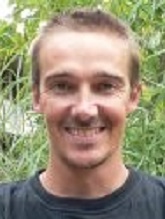
|
Dr David Fairclough
DPIRD Principal Research Scientist
david.fairclough@dpird.wa.gov.au
Role
As a member of DPIRD’s Aquatic Science and Assessment (ASA) branch Senior Leaders Team, Dr Fairclough leads DPIRD’s scientific team responsible for monitoring, assessment and science programs for Western Australia’s demersal finfish resources.
He also collaborates with scientists and staff in ASA’s Ecosystems and Nearshore branches and with external agencies, research providers and stakeholders.
|
|---|
Dr Fairclough leads Project 4.1 (Snapper connectivity and evaluation of juvenile stocking) in Theme 4 of the WAMSI Westport Marine Science Program, which is examining snapper spawning aggregations in Cockburn Sound in relation to the broader west coast and methods to monitor stock enhancement of snapper.
Dr Fairclough is also a co-lead on Project 4.2.1 (Spatial distribution and temporal variability in life stages of key fish species in Cockburn Sound), studying the distribution and abundance of different life cycle stages of fish species in Cockburn Sound and testing novel acoustic methods for monitoring spawning aggregations of snapper. This research will increase the ability to understand the potential impacts of both construction and ongoing operations of the proposed port development and how these impacts might be mitigated.
Expertise
25 years’ experience in fish and fisheries research in marine and estuarine environments.
Publications
David Fairclough - Google Scholar
Qualifications
- PhD, Murdoch University, WA, 2005. Thesis: The biology of four tuskfish species (Choerodon: Labridae) in Western Australia.
- BSc (Hons), Murdoch University, 1997. The biology of the Australian herring Arripis georgianus.
- BSc (Biological Sciences), Murdoch University, 1996.
|
|---|

|
Dr Danielle Johnston
DPIRD Senior Research Scientist,
Nearshore Program
danielle.johnston@dpird.wa.gov.au
Role
Dr Johnston leads DPIRD’s Nearshore team responsible for the monitoring and assessment of Western Australia’s blue swimmer crab, mud crab, sand crab, squid and cuttlefish resources.
Dr Johnston also leads the WAMSI Westport Marine Science Program Theme 4 project 4.2.1 (Spatial distribution and temporal variability in life stages of key fish species in Cockburn Sound) and is co-lead on project 4.2.3 (Trophic pathways and food web structure) and co-leads project 2.4 (Benthic communities and soft sediment) within in Theme 2.
|
|---|
Project 4.2.1 will provide a comprehensive understanding of the spatial distribution, temporal variability (seasonal and inter-annual) and juvenile/adult habitat usage of key marine fish and invertebrate species in Cockburn Sound and Owen Anchorage and their relationships to habitat (e.g. seagrass, hard substrates and sand habitats) and water quality. The project uses a range of sampling methods including trawling, seining, trapping, jigging and baited remote underwater video stations (BRUVs) at a comprehensive range of sites to determine relative abundances of fish and invertebrate species across various habitats on a seasonal basis. This project provides samples for numerous WAMSI-Westport projects, and forms the basis for many collaborations across themes. The research will increase our understanding of how impacts from port building and future port operations might affect the different life stages of key fish species, and how these impacts might be mitigated.
Expertise
20+ years’ fisheries and aquaculture research experience working in a range of freshwater, estuarine and marine environments.
Qualifications
- PhD, James Cook University, QLD, 1996. Thesis: Food acquisition, ingestion and digestion in the Slipper Lobster Thenus orientalis Lund (Decapoda:Scyllaridae).
- BSc Hons (First Class), James Cook University, QLD, 1991.
- BSc Marine Biology and Biochemistry, James Cook University, QLD 1990.
|
|---|

|
Nick Caputi
DPIRD Senior Principal Research Scientist, Nearshore Fisheries
nick.caputi@dpird.wa.gov.au
Role
Dr Caputi has been involved with research on invertebrate fisheries with a focus on stock assessment. His research includes catch predictions, spawning stock-recruitment relationships, and ecosystem-based fisheries management. He has a strong interest in environmental effects on fisheries, particularly understanding the effects of climate change on fisheries resources, including extreme events such as marine heatwaves.
Dr Caputi co-leads the Project 4.3 (Investigating effects of climate change on biota in Cockburn Sound) within Theme 4 of the WAMSI Westport Marine Science Program.
|
|---|
Expertise
Dr Caputi has more than 40 years’ experience and published more than 60 international peer-reviewed papers and 18 book chapters. He has been awarded a Churchill Fellowship to study fisheries research overseas, is a member of the Marine Stewardship Council Peer-Review College, and has participated in reviews of fisheries research and climate change projects in the United States of America, as well as stock assessments of the prawn fishery in Mozambique.
Qualifications
- PhD, Murdoch University, WA, 1989. Thesis: Aspects of stock-recruitment relationships for crustaceans.
- BSc (Hons), University of WA, 1972.
|
|---|

|
Dr Stephen Newman, DPIRD
Senior Principal Research Scientist
Offshore - Aquatic Science
stephen.newman@dpird.wa.gov.au
Role
Dr Newman is based at the Western Australian Fisheries and Marine Research Laboratories (Hillarys) and currently leads DPIRD’s Offshore Section of the Aquatic Science and Assessment Branch. The research undertaken by this group underpins the advice provided to managers for the sustainable harvest of the demersal, shark and ray, pelagic, and trawl resources of Western Australia.
|
|---|
Dr Newman’s research focus has primarily involved investigating the status and assessment of the fish resources of Western Australia, assessing bycatch and discarding issues, investigating protected species interactions and developing mitigation strategies, evaluation of non-destructive assessment techniques, examining the biology and ecology of fishes with particular relevance to fisheries, effects of climate change on fish and fisheries of tropical WA and Marine Stewardship Council (MSC) assessment of relevant fisheries.
Dr Newman co-leads the WAMSI Westport Marine Science Program Project 4.4 (Effects of total suspended solids on key fish species).
Expertise
Dr Newman has more than 25-years’ experience and has published more than150 international peer-reviewed papers and 200 reports. He has multiple research collaborations with scientists and students at universities, national and international organisations, has led large multi-disciplinary research teams, and is involved in studies on the stock assessment, biology and ecology of aquatic resources, as well as the connectivity of several fish species, and ecosystem processes and impacts to resources use.
He is currently the Specialty Chief Editor for Marine Fisheries, Aquaculture and Living Resources in Frontiers in Marine Science (IF 5.2, Citescore 5.2).
Qualifications
- PhD, James Cook University, Queensland, 1995. Thesis: Spatial variability in the distributions, abundance, growth, mortality and age structures of tropical snappers (Pisces: Lutjanidae) in the central Great Barrier Reef, Australia.
|
|---|
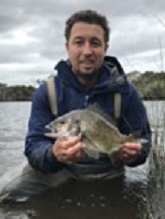
|
Dr Daniel Yeoh
DPIRD Research Scientist
daniel.yeoh@dpird.wa.gov.au
Role
Dr Yeoh is involved with several projects in the WAMSI Westport Marine Science Program Theme 4, primarily project 4.2.1 (Spatial distribution and temporal variability in life stages of key fish species in Cockburn Sound) and 4.2.2 (Zooplankton in Cockburn Sound). Dan has been extensively involved with the design and implementation of a comprehensive range of sampling programs aimed to determine their distribution and abundance of numerous fish and invertebrate species at various life stages (larval, juvenile, adults).
This includes developing novel methods to gather fine-scale data on key recreational species such as southern calamari to determine how stocks and fishing activities may be affected by the proposed port development.
|
|---|
Expertise
Dan has a background in marine and estuarine ecology, especially understanding the spatio-temporal dynamics of fish and invertebrate populations to support ecosystem-based fisheries management. He has extensive experience conducting field surveys of fish and invertebrates throughout WA, and prior to joining these Science Program projects in 2021, worked for DPIRD on the assessment of various crab, squid and cuttlefish resources, as well as ecological monitoring in the Walpole and Nornalup Inlets Marine Park.
Qualifications
- PhD, Marine Science, Murdoch University, WA, 2018. Thesis: Understanding the dynamics of fish ecology and movements: implications for management of a temperate estuarine marine park.
- BSc Marine Science (Honours), Murdoch University, WA, 2013. Thesis: The gill net selectivity of four teleost species in south-western Australian estuaries.
|
|---|
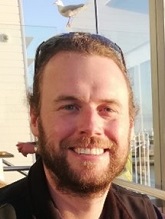
|
Peter Mitchell,
DPIRD Research Scientist
peter.mitchell@dpird.wa.gov.au
Role
Peter is contributing to several projects within Theme 4 of the WAMSI Westport Marine Science Program, in particular projects 4.2.1 (Spatial distribution and temporal variability in life stages of key fish species in Cockburn Sound) and 4.3 (Investigating effects of climate change on biota in Cockburn Sound). With the wide variety of sampling approaches implemented in these projects, Peter will be applying a range of modelling techniques to understand how key fish species utilise and move throughout Cockburn Sound with the changing seasons. |
|---|
Expertise
Peter joined DPIRD after seven years working for the Centre of Environment, Fisheries and Aquaculture Science (CEFAS) in the United Kingdom. During his time in the UK, his research primarily focused on applying spatial modelling techniques to provide information to underpin the management of benthic and fish communities. He has worked on a range of projects within the UK, Europe and Atlantic and Indian Oceans, conducting field surveys and providing advice to local governments to support sustainable management of their marine resources.
Qualifications
- BSc Marine Biology (Hons), Deakin University, Vic, 2014. Thesis: Sensitivity of fine‐scale species distribution models to locational uncertainty in occurrence data across multiple sample sizes.
- BSc, University of Melbourne, Vic, 2009.
|
|---|
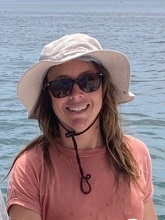
|
Lisa West, DPIRD Technical Officer
lisa.west@dpird.wa.gov.au
Role
Lisa is involved in a range of field sampling programs, primarily related to the WAMSI Westport Marine Science Program Project 4.2.1 (Spatial distribution and temporal variability in life stages of key fish species in Cockburn Sound) and Project 4.2.2 (Zooplankton in Cockburn Sound). Her main roles include surveying fish and invertebrates using a range of fisheries sampling techniques, conducting surveys aboard commercial vessels, laboratory processing of samples and organisation of field and vessel logistics.
|
|---|
Expertise
Lisa has eight years’ experience working on fisheries and marine research programs with DPIRD and the Department of Biodiversity Conservation and Attractions (DBCA). Her previous DPIRD experience has involved shark research and commercial vessel monitoring. As a marine ranger she worked in several marine parks throughout WA, conducting a range of compliance and research activities, which involved extensive boat handling and research diving work.
Qualifications
- BSc (Hons), Marine Science, Murdoch University, WA, 2013. Thesis: Diurnal variation in zooplankton communities and its relationship to whale shark (Rhincodon typus) movements at Ningaloo Marine Park, Western Australia.
- BSc Marine and Environmental Science, Murdoch University, WA, 2012.
- Coxswain Grade 1.
- ADAS scientific diver.
|
|---|
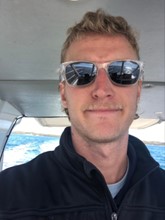
|
Josh Seymour,
DPIRD Technical Officer
josh.seymour@dpird.wa.gov.au
Role
Josh joined DPIRD in mid-2022, and is involved with a range of field sampling programs, primarily related to the WAMSI Westport Marine Science Program Project 4.2.1 (Spatial distribution and temporal variability in life stages of key fish species) and Project 4.2.2 (Zooplankton in Cockburn Sound). His main roles include surveying fish and invertebrates using a range of sampling techniques, calibration and maintenance of scientific equipment and organisation of field and vessel logistics.
|
|---|
Expertise
Josh has an aquaculture background and experience conducting field and laboratory research on several fish and shellfish species. This role involved conducting biomass surveys and collecting biological data, as well as laboratory analyses and the construction and maintenance of various aquaculture systems.
Qualifications
- BSc Marine Biology and Conservation and Wildlife Biology, Murdoch University, WA, 2019.
- Coxswain Grade 2.
- Rescue diver.
|
|---|